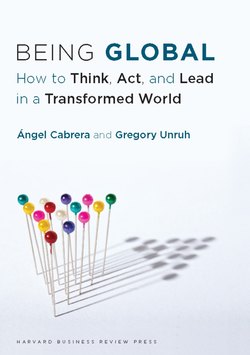Читать книгу Being Global - Gregory Unruh - Страница 9
На сайте Литреса книга снята с продажи.
Becoming a Global Leader
ОглавлениеWe have written this book for leaders and aspiring leaders who aim to think, act, and, especially, be global and want some help getting there. You may be just starting in a career and creating a long-term plan; you may be in the middle of your career and considering an overseas position or a way to take a different direction.
Our focus on the global aspects of leadership of course relies on a great deal of previous leadership thinking that continues today. We have been influenced by thinkers such as McGill University's Henry Mintzberg; the University of Southern California's Warren Bennis; Wharton's Robert House; University of Washington's Bruce Avolio; Harvard's Rosabeth Moss Kanter, John Kotter, and Nitin Nohria; and INSEAD's Manfred Kets de Vries, to name a few.1 Their work offers valuable insight, each in their way, for leaders managing people and tackling crises, leaders navigating through change, leaders pursing innovation, and so on.
Where Being Global differs from other leadership tools is in its international focus. While the globalization of the world economy has been extensively documented, leadership scholars are yet to fully address the ways in which leadership changes in a global context. Most take the position—either directly or by default—that leading a global firm is not very different from leading a local or regional one: there are the same challenges of securing resources, building and motivating teams, creating and applying new business models, understanding and serving markets, raising and managing capital, and so on.
Our view, however, is that everything becomes much more complex when executed in a cross-national, cross-cultural context. It is not as simple as adopting the proper meal etiquette or learning the language (and anyone who has tried knows even those things aren't so simple). This book is all about the context, the complexity, the connections, and the integrity required when working with different people and cultures.
Other management scholars have focused on how cultural differences may determine the effectiveness of a particular leadership style. This scholarship tradition is rooted in the works of Geert Hofstede and Fons Trompenaars, which has resulted in abundant research on cross-cultural leadership (including the GLOBE project led by our own colleague Mansour Javidan and involving researchers around the world, which we'll discuss in detail in chapter 2). Our focus, however, is not how you can move from one cultural context to another or on how to adapt your style to remain effective in an international assignment. Our interest is in how you can actually transcend culture, become effective across cultural settings, effectively interact with culturally diverse individuals and organizations, and create value.
More importantly, Being Global is different due to its inward focus. Most existing literature focuses on the outward issues of what leaders do—the actions they take, the words they use, and so on. We agree that the ultimate purpose of self-development is to prepare you to take appropriate action, and in the book, we often show the leaders we profile in action. Nonetheless, our main purpose is to invite you to pause and look within yourself. We are interested less at this stage in what you want to do than in what you want to be and how we can help you become a truly global leader.
